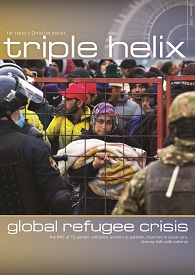Events in the Middle East over the last few years have challenged the long-held belief that medical services are neutrals and not to be attacked by either side. In Syria, as the civil war has headed towards its climax, bombing of hospitals has become alarmingly frequent. (1) In Yemen, a nation facing the worst humanitarian crisis in the world today according to the UN, (2) ports and facilities being used to get essential aid, food and medical supplies to the most vulnerable have been selectively targeted by forces trying to contain the insurgency.(3) In a more individual context, the killing of a Palestinian nurse Razan al-Najar in Gaza as she sought to help the injured has generated much anger around the world. (4)
Christian medics, nurses and other health professionals are often working in unstable countries, and facing this sort of danger is nothing new. Those working in mission hospitals in the Democratic Republic of Congo at the start of the civil war in the 90s are all too aware of how often Christian hospitals and health workers were brutally targeted by rebel forces. However, the latest violence has been increasingly at the hands of government forces, some of them from supposedly democratic, westernised nations.
The reality is that in war, especially one where a nation or a people perceive a real, existential threat, norms, conventions and niceties often get forgotten. We see human sinfulness at its most raw, particularly the willingness to sacrifice even deeply held values for the sake of security. A Christlike response in these situations is to continue to serve selflessly and to bear witness to the truth.
While we should protest against such flagrant disregard for the norms and international conventions that such attacks represent, we also need to pray for the many health workers, especially nationals, who do continue to offer the best care that they can in the face of such awful circumstances and threats to their own lives.
Review by Steve Fouch, CMF Head of Communications
































